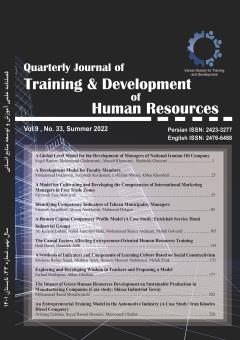شناسایی عوامل علّی مؤثر بر تربیت منابع انسانی کارآفرین محور از دید مدیران و سیاست گذران آموزشی
الموضوعات :
1 - استادیار مدیریت آموزشی، دانشکده علوم تربیتی و روانشناسی، دانشگاه بیرجند، بیرجند، ایران--h.barati@birjand.ac.ir
2 - استادیارگروه علوم تربیتی، دانشگاه فرهنگیان، تهران، ایران
الکلمات المفتاحية: عوامل علّی, تربیت منابع انسانی کارآفرین محور, مدیران آموزشی, سیاست گذران,
ملخص المقالة :
کارآفرینی و رفتار کارآفرینانه بهعنوان زمینههای موضوعی و چارچوبهای ادراکی تنها زمانی حاصل میشود که دانشگاهها از برج عاج به دانشگاه کارآفرین تبدیل شوند. ازاینرو؛ مؤسسات آموزش عالی بهویژه دانشگاهها نقش بسیار مهمی در فرایند نوآوری و کارآفرینی دارند. پژوهش حاضر، باهدف شناسایی عوامل علّی مؤثر بر تربیت منابع انسانی کارآفرین محور از دید مدیران و سیاست گذران آموزشی دانشگاه فرهنگیان انجام شد. این پژوهش بر مبنای هدف، در ذیل پژوهشهای کاربردی است که به روش کیفی انجامشده است. مشارکتکنندگان پژوهش، شامل کلیه خبرگان و فعالان بخش کارآفرینی و سیاست گذران حوزه منابع انسانی دانشگاه فرهنگیان در سال تحصیلی 1399-1400 بود که با استفاده از روش نمونهگیری هدفمند 19 نفر بهعنوان مشارکتکننده انتخاب شدند. برای جمعآوری دادهها در این پژوهش از روش مصاحبه نیمه ساختاریافته استفاده شد. اعتبار ابزار اندازهگیری دادهها با استفاده از روش توافق کدگذاران مورد تأیید واقع شد و برای تحلیل دادهها از نرمافزار MAXQDA10 استفاده شد. نتایج پژوهش، بیانگر این بود که عوامل علّی مؤثر بر تربیت منابع انسانی کارآفرین محور در دانشگاه فرهنگیان را میتوان در قالب 3 مؤلفه (مدیریت، منابع مادی و غیرمادی، و راهبردها) و 56 شاخص طبقهبندی کرد که دراینبین، عوامل مربوط به نهادینهسازی بحث کارآفرینی؛ اصلاح سیستم کار راهه شغلی و جانشین پروری؛ تقویت روحیه کار تیمی؛ تقویت بینش راهبردی و رهبری تحولگرا؛ حمایتهای مادی و غیرمادی و استفاده از نسلهای جدید آموزشی بیشتر مورد تأکید قرارگرفته است.
Barba-Aragón, María Isabel, and Daniel Jiménez-Jiménez. "HRM and radical innovation: A dual approach with exploration as a mediator." European Management Journal, 2020; 38(5):791-803.
Swart, Juani, Nina Katrin Hansen, and Nicholas Kinnie. "Strategic Human Resource Management and performance management in professional service firms." In The Oxford handbook of professional service firms. 2015.
Kaufman BE. Strategic human resource management research in the United States: A failing grade after 30 years? Academy of Management Perspectives. 2012; 26(2):12-36.
Jackson SE, Schuler RS, Jiang K. An aspirational framework for strategic human resource management. Academy of Management Annals. 2014; 8(1):1-56.
Marler JH, Fisher SL. An evidence-based review of e-HRM and strategic human resource management. Human resource management review. 2013; 23(1):18-36.
Klofsten M, Fayolle A, Guerrero M, Mian S, Urbano D, Wright M. The entrepreneurial university as driver for economic growth and social change-Key strategic challenges. Technological Forecasting and Social Change. 2019; 141:149-58.
Audretsch DB, Link AN. Entrepreneurship and knowledge spillovers from the public sector. International Entrepreneurship and Management Journal. 2019; 15(1):195-208.
Hamdan AM. Entrepreneurship and economic growth: An Emirati perspective. The Journal of Developing Areas. 2019; 53(1).
Kallab TE, Salloum C. Educational attainment, financial support and job creation across Lebanese social entrepreneurships. Entrepreneurship Research Journal. 2019; 9(1):1-2.
Kouakou KK, Li C, Akolgo IG, Tchamekwen AM. Evolution view of entrepreneurial mindset theory. International Journal of Business and Social Science. 2019; 10(6):116-29.
Bosman L, Fernhaber S, SpringerLink (Online service). Teaching the entrepreneurial mindset to engineers. Switzerland: Springer International Publishing; 2018.
Dissanayake S. Entrepreneurship and the Entrepreneur: A Synthesis View.2013.
Maritz A. Illuminating the black box of entrepreneurship education programmes: Part 2. Education+ Training. 2017.
Maritz A, Brown CR. Illuminating the black box of entrepreneurship education programs. Education+ Training. 2013.
Costanza F. Stimulating new business creation through system dynamics education. Journal of Economic and Administrative Sciences. 2019.
Kuznetsova IG, Surikov YN, Votchel LM, Aleynikova MY, Voronkova OY, Shichiyakh RA. The methodological aspect of human capital formation in the digital economy. International Journal of Mechanical Engineering and Technology. 2019; 10(2):1020.
Din BH, Anuar AR, Usman M. The effectiveness of the entrepreneurship education program in upgrading entrepreneurial skills among public university students. Procedia-Social and Behavioral Sciences. 2016; 224:117-23.
Ball S. The importance of entrepreneurship to hospitality, leisure, sport and tourism. Hospitality, leisure, sport and tourism network. 2005; 1(1):1-4.
Seikkula-Leino J, Satuvuori T, Ruskovaara E, Hannula H. How do Finnish teacher educators implement entrepreneurship education? Education+ Training. 2015.
Sadeghi A, Najafi H. The implementation of teacher education multicultural curriculum strategies in Iran; based on, the experiences of Australia, Canada, Malaysia and India. Research in Teacher Education (RTE). 2017; 1(1):127-46. [In Persian].
Fejes A, Nylund M, Wallin J. How do teachers interpret and transform entrepreneurship education? Journal of Curriculum Studies. 2019; 51(4):554-66.
Mahdi R. Skill training position in the third generation universities.2016. [In Persian].
Ratten V, Usmanij P. Entrepreneurship education: Time for a change in research direction? The International Journal of Management Education. 19(1):100367.
Dana LP. Religion as an explanatory variable for entrepreneurship. InWorld Encyclopedia of Entrepreneurship. 2021. Edward Elgar Publishing.
Huber LR, Sloof R, Van Praag M. The effect of early entrepreneurship education: Evidence from a field experiment. European Economic Review. 2014; 76-97.
Youggeunlee., Patrick m. kreiser alex h. wrede, and sanvisna kogelen. University – based education and the formation of entrepreneurial capabilities. Entrepreneurship education and pedagogy, 2018; 1 (4), 304 – 329.
Audretsch DB, Link AN. Entrepreneurship and knowledge spillovers from the public sector. International Entrepreneurship and Management Journal. 2019; 15(1):195-208.
Audretsch DB. From the entrepreneurial university to the university for the entrepreneurial society. The Journal of Technology Transfer. 2014; 39(3):313-21.
Ahmadi S, Akhavan MM, Mokhtari M. Identifying Entrepreneurial Opportunities in Social Sciences and Sociological Explanation of Factors Affecting the Exploitation of Opportunities in Iran. Applied Sociology. 2018; 29(3):181-202. [In Persian].
Kvale S. The psychoanalytic interview as qualitative research. Qualitative inquiry. 1999; 5(1):87-113.
Yaghoubi N, Dehghani M, Omidvar M. Entrepreneurial University Agility Model with Knowledge Management Approach. Management Researches. 2019; 12(43):185-204.
Amrollah O,Dr. Hakimzade R. A Comparative Study of the Quality Assessment System of Teacher Training Curriculum in South Korea, England and Iran. Journal of Higher Education Curriculum
Studies.. 2014; 5(9):7-25.
Beltadze GN. Game Theory-basis of Higher Education and Teaching Organization. International Journal of Modern Education & Computer Science. 2016; 8(6).


